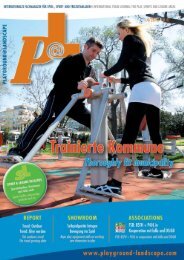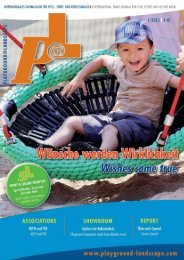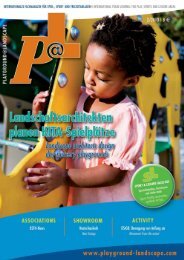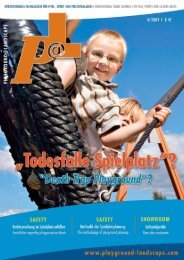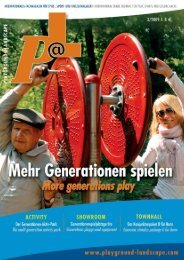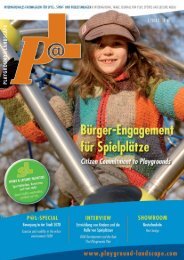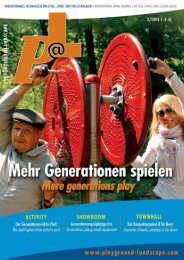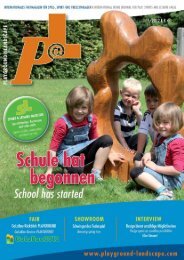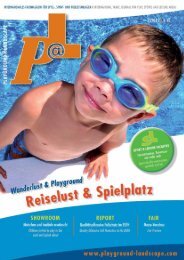Vitalitätstraining für Jung und Alt - Playground@Landscape
Vitalitätstraining für Jung und Alt - Playground@Landscape
Vitalitätstraining für Jung und Alt - Playground@Landscape
Sie wollen auch ein ePaper? Erhöhen Sie die Reichweite Ihrer Titel.
YUMPU macht aus Druck-PDFs automatisch weboptimierte ePaper, die Google liebt.
Foto:Photocase ///Juttaschnecke<br />
Inspiring Play for 25 years<br />
As the Association of Play Industries (API) celebrates 2009 its milestone<br />
25 year anniversary, its crucial role as the leading trade body within the<br />
play sector has become ever more significant.<br />
Politically impartial, and with a wealth of knowledge and experience, the API aims to<br />
provide a united play-industry voice and has worked hard to form and develop close relations<br />
with government partners and relevant national bodies. Having developed a<br />
so<strong>und</strong> working relationship with the DCSF and Play England, the API are consulted on<br />
a range of important industry issues – a liaison the API are keen to maintain and develop<br />
going forward.<br />
76<br />
Design<br />
One of the biggest challenges for the API lies in one of its aims; to promote good play<br />
space design, installation and workmanship industry-wide, and its members fully<br />
support the ‘Design for Play’ guide published by the DCSF and endorsed by the DCMS<br />
and communicated through Play England. This is an aspirational document which moves<br />
the previous guidance forward positively.<br />
The current debate within the industry surro<strong>und</strong>ing external unsupervised play provision<br />
it not as simple as some would have us believe, with terms such as KFC (Kit, Fence and<br />
Carpet) now replaced with ‘Natural Play’ and GMPs (Grass Mo<strong>und</strong>s and Plants) identified<br />
as examples of what is needed today to liberate our children’s play provision.<br />
The API and its members have always recognised that play spaces must reflect their<br />
environments, and this can be seen through the diversity of designs delivered by its<br />
members.<br />
Play spaces delivered <strong>und</strong>er the LAP, LEAP and NEAP guidance are not all “bland<br />
playgro<strong>und</strong>s which restrict children’s creativity” as stated by some, but are a reflection<br />
of what was considered as practical and sustainable by clients operating with severely<br />
limited capital and revenue budgets. These authorities should be praised for continuing<br />
to invest in and appreciate the importance of free play provision for their communities.<br />
Moving this agenda forward sustainability is an essential part of the PlayBuilder and<br />
PathFinder agenda, with the current investments needing to build on the past and not<br />
destroy the good work carried out by prior guidance and commitments.<br />
Risk in Play<br />
Playgro<strong>und</strong> equipment should be safe yet challenging and stimulating. The API puts<br />
this statement at the forefront of its thinking when working on the various programmes<br />
and f<strong>und</strong>ing that can help local authorities achieve this balance.<br />
The API was acknowledged for its invaluable input in the ‘ Managing Risk in Play<br />
Provision’ guidance published by the DCSF and endorsed by the DCMS.<br />
Procurement<br />
When looking at play procurement and supply, it’s important to think about lines of liability.<br />
The key to a successful contract is to ensure there are clear lines of responsibility.<br />
API members are specialists in play space design and delivery; they are responsible<br />
for more than 2000 play spaces per year and have developed methods and processes<br />
that work. Yes there are large engineering projects where qualified project management<br />
is essential, but in the main, play spaces are delivered on limited budgets which cannot<br />
justify separate costs for the design and project management.<br />
API members typically offer a free design service and have between £10m and £40m<br />
worth of live quotations, some of which can be up to five years old. With an average<br />
value of £30K per site, many API member companies each have a current investment<br />
of between £1.5m and £6m in play space designs. These free designs and quotes provide<br />
an invaluable service supporting all those authorities interested in delivering play<br />
schemes from: community groups, parish councils and private projects to the larger organisations<br />
such as councils, corporate organisations, landscape architects and builders.<br />
All this happens long before a contract or any guarantee of payment is agreed<br />
and often, the project is still at a competitive shortlist stage. (www.api-play.org)



